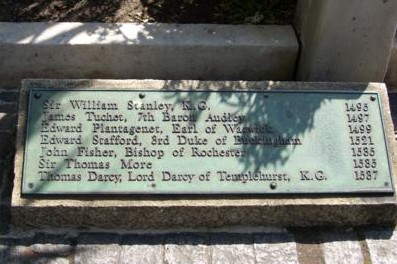On the 6th July 1535, Henry VIII’s former friend and Lord Chancellor, Sir Thomas More, was beheaded on Tower Hill. His crime? High treason.
But did Sir Thomas More really commit high treason?
Crossing a King
No, I don’t think he did. I think his only crime was not giving his full support to the annulment of the King’s marriage to Catherine of Aragon. More was an influential man and although he never spoke out against the King, choosing to resign from his post and keep silent instead, Henry VIII felt betrayed and made an example of More and John Fisher, Bishop of Rochester, who also refused to sign the oath.
In my post, “Henry VIII – A Tyrant or Just Misunderstood?”, I made the point that Sir Thomas More was arrested in April 1534 for refusing to swear the Oath of Succession, yet he was actually put to death for rejecting the King’s new title of Supreme Head of the Church of the Church of England. This “offence” was not made treasonable until the Treason Act of 1535 so how did More manage to commit treason in 1534?! The only evidence was the word of Richard Rich, a friend of Thomas Cromwell. He claimed that he had heard More denying that the King was Head of the Church. How convenient. It reminds me of Anne Boleyn being executed for committing adultery, yet her marriage to the King was annulled shortly before her death.
I believe that Sir Thomas More was an intelligent and diplomatic man, and he kept his thoughts and feelings to himself. He had a strong faith, which prevented him from fully supporting the King, but he also loved and respected Henry VIII, the man he had once written poetry in praise of, and he did not want to openly defy him.
I know that Sir Thomas More was responsible for the burnings of many Protestants, people he believed to be evil heretics, but I find it sad that Henry VIII could turn against a man who had showed him nothing but love and support. More had helped shape the King. He had been instrumental in ensuring that Henry, as prince, received the best Renaissance education, and then he had been an important adviser to the new, and very young, King. In his poetry in celebration of Henry VIII’s coronation, he likened the King’s succession to a second coming and obviously had high hopes for his reign, these hopes were dashed when the King became intent of divorcing his first wife and using religion to help him to do it.
Sir Thomas More’s Execution
Although Sir Thomas More had been sentenced to the full traitor’s death, the King commuted his sentence to death by beheading and he was executed two weeks after his good friend, John Fisher, Bishop of Rochester.
Here is a contemporary account of Sir Thomas More’s execution:-
“About Nine he was brought out of the Tower; his Beard was long, his face pale and thin, and carrying a Red Cross in his Hand, he often lift up his Eyes to Heaven; a Woman meeting him with a cup of Wine, he refused it saying, Christ at his Passion drank no wine, but Gall and Vinegar. Another Woman came crying and demanded some Papers she said she had left in his Hands, when he was Lord Chancellor, to whom he said, Good woman, have Patience but for an Hour and the King will rid me of the Care I have for those Papers, and every thing else. Another Woman followed him, crying, He had done her much Wrong when he was Lord Chancellor, to whom he said, I very well remember the Cause, and is I were to decide it now, I should make the same Decree.
When he came to the Scaffold, it seemed ready to fall, whereupon he said merrily to the Lieutenant, Pray, Sir, see me safe up; and as to my coming down, let me shift for myself. Being about to speak to the People, he was interrupted by the Sheriff, and thereupon he only desired the People to pray for him, and bear Witness he died in the Faith of the Catholic Church, a faithful Servant both to God and the King. Then kneeling, he repeated the Miserere Psalm with much Devotion; and, rising up the Executioner asked him Forgiveness. He kissed him, and said, Pick up thy Spirits, Man, and be not afraid to do thine Office; my Neck is very short, take heed therefore thou strike not awry for having thine Honesty. Laying his Head upon the Block, he bid the Executioner stay till he had put his Beard aside, for that had committed no Treason. Thus he suffered with much Cheerfulness; his Head was taken off at one Blow, and was placed upon London-Bridge, where, having continued for some Months, and being about to be thrown into the Thames to make room for others, his Daughter Margaret bought it, in closed it in a Leaden Box, and kept it for a Relique. Hall’s Chron. Vol. 2. S. 2.”

RIP St Thomas More, you are remembered.
You can read more about Sir Thomas More at:-
Notes and Sources
- YouTube video clip from “A Man for All Season” starring Paul Scofield as Sir Thomas More
- Contemporary account from A Complete Collection of State Trials and Proceeding Upon Impeachments for High Treason, etc (London, 1719), cited at http://www.law.umkc.edu/faculty/projects/FTrials/more/moretrialreport.html